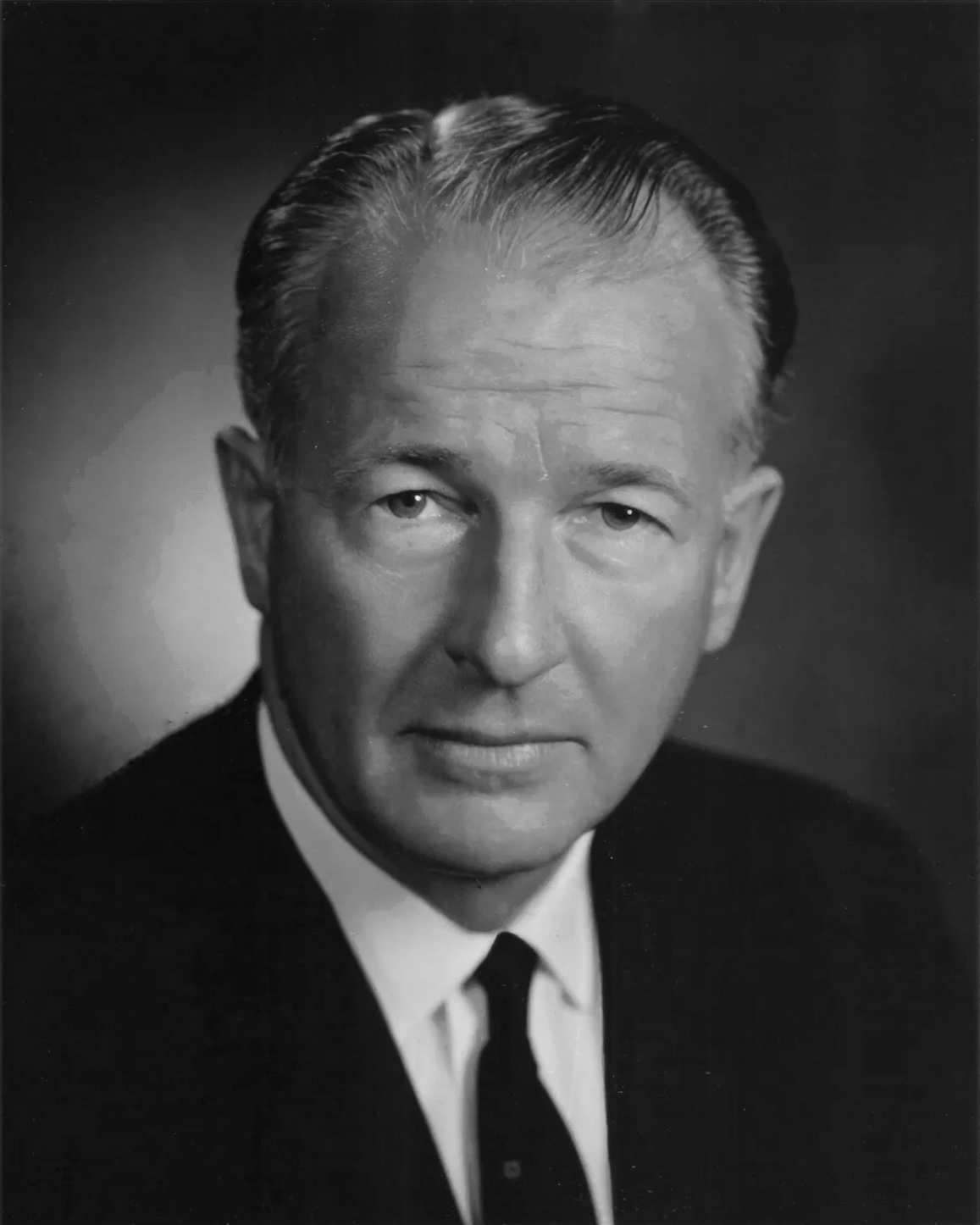Louis C. Wyman
Louis Crosby Wyman (born March 16, 1917 in Manchester , New Hampshire , † May 5, 2002 in West Palm Beach , Florida ) was an American politician ( Republican Party ) who represented the state of New Hampshire in both chambers of Congress . In the United States Senate , he completed a term of just four days.
Legal career
Louis Wyman attended the University of New Hampshire at Durham , where he graduated in 1938. In 1941 he graduated from the Law School of Harvard University , whereupon he was admitted to the Massachusetts and New Hampshire Bar Associations and began practicing in Boston . During the Second World War he served from 1942 in the rank of lieutenant in the naval reserve and was used in Alaska .
He left the military in 1946. That year Wyman was still working as legal advisor to a Senate committee in Washington ; In 1947 he became secretary to US Senator Styles Bridges . He then acted from 1948 to 1949 as legal advisor to a joint congress committee on economic aid abroad. Between 1953 and 1961 Wyman held the office of Attorney General of New Hampshire; while in 1957 he was President of the National Association of Attorneys General . Eventually in 1961 he became a member of the Advisory Board to the Governor of New Hampshire. He has also served on numerous state judicial committees.
politics
In 1962, Wyman first applied for a national political mandate. He was elected as a representative of the first congressional district of New Hampshire to the House of Representatives of the United States , where he initially only stayed from January 3, 1963 to January 3, 1965. In 1966, however, he faced again against the previously victorious Democrat Joseph Oliva Huot and was successful. Another three confirmations by the voters followed.
In 1974, Wyman did not run for re-election. Instead, he ran for the US Senate, where the mandate of the voluntarily retiring Republican Norris Cotton was to be filled. Wyman faced the Democrat John A. Durkin and defeated him by a margin of 355 votes. However, Durkin demanded a recount of the votes, which then saw him ahead by ten votes. Governor Meldrim Thomson then declared the Democrats the winner; but now Wyman insisted on a new count, which in turn produced a different result: There were now two more votes for the Republican.
In the meantime, Cotton's tenure as senator was nearly over. He resigned on December 31, 1974; on the same day, Wyman was appointed by Governor Thomson to succeed him for the remaining four days of the session. However, John Durkin did not give up and took his case to the Senate plenary. The Rules Committee was then assigned to clarify the problem, but this did not succeed. The Senate seat remained vacant during this time, with the Democrats making several unsuccessful attempts to have Durkin re-elected as senator. Eventually Wyman proposed a new election, which Durkin accepted. On August 8, 1975, Norris Cotton took over his previous seat on a provisional basis.
The by-election resulted in a comparatively clear lead of 28,000 votes for the Democrat Durkin. Thus Wyman had to forego the Senate mandate.
Wyman then retired from politics and served from 1978 to 1987 as a judge at the Superior Court of New Hampshire. He spent his retirement alternately in his hometown of Manchester and in West Palm Beach, where he succumbed to complications from cancer in May 2002.
Web links
- Louis C. Wyman in the Biographical Directory of the United States Congress (English)
- Louis C. Wyman in the database of Find a Grave (English)
- Louis C. Wyman in the nndb (English)
supporting documents
- ^ Closest Election in Senate History. In: Senate.gov ; Anne M. Butler, Wendy Wolff: The Election Case of John A. Durkin v. Louis C. Wyman of New Hampshire (1975). In: Senate.gov , 1995.
| personal data | |
|---|---|
| SURNAME | Wyman, Louis C. |
| ALTERNATIVE NAMES | Wyman, Louis Crosby (full name) |
| BRIEF DESCRIPTION | American politician |
| DATE OF BIRTH | March 16, 1917 |
| PLACE OF BIRTH | Manchester , New Hampshire |
| DATE OF DEATH | May 5, 2002 |
| Place of death | West Palm Beach , Florida |



